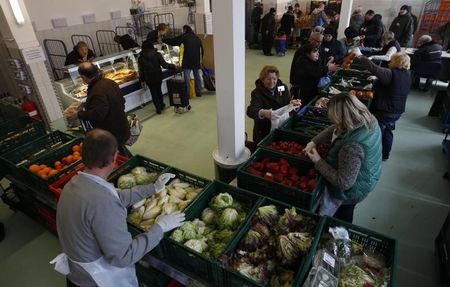By Martin Santa
BRUSSELS (Reuters) - Annual inflation in the euro zone fell in July to its lowest since the height of the financial crisis in 2009, keeping the risk of deflation on policymakers' radar but unlikely to spur the European Central Bank into further policy action.
The slowdown to 0.4 percent, coming amid subdued wage pressures despite a fall in unemployment to a near two-year low, will fuel concerns of a possible broad fall in prices across the 18-nation bloc.
But much of the decline in inflation was down to a sharp fall in volatile energy prices, Thursday's data from EU statistics office Eurostat showed, and the ECB is still waiting to assess the impact of a batch of measures it presented in June to pep up a fragile economic recovery.
"Today's figures don't give any assurance that the euro zone is already out of the deflation danger zone," said Peter Vanden Houte, chief euro zone economist at ING.
"Moreover, with the escalating conflict with Russia dampening growth prospects, it seems unlikely that deflation fears will disappear any time soon."
Consumer prices rose at their lowest annual rate since October 2009 when they fell by 0.1 percent, Eurostat data showed.
Core inflation - which excludes energy, food, tobacco and alcohol costs - was unchanged at 0.8 percent for the second month in a row. Energy prices fell 1.0 percent on the year.
NO CHANGE AT ECB
The ECB holds its next policy meeting next Thursday, and initial reactions in the market - where assets were little changed - and from analysts suggested the inflation numbers had not shifted expectations that monetary policy will stay put.
"We believe that the ECB will sit tight through the rest of 2014," said Howard Archer, chief European economist at IHS.
ECB officials have said inflation expectations in the bloc remain in line with the bank's target of just under 2 percent over the medium term, even though the ECB sees inflation rising only slowly to 1.5 percent in the final quarter of 2016.
Analysts see limited risks of outright deflation in the euro zone, amid expectations that energy prices may soon rise again and sharp food price disinflation be draw to a close.
"We still expect the euro zone to avoid overall deflation," Archer added.
ECB President Mario Draghi has said the central bank is ready to take further unconventional measures if needed, and said that quantitative easing - or money printing to buy assets - "falls squarely in our mandate".
But the barriers to embarking on such a round of broad asset purchases are high, notably for some influential ECB policymakers such as Bundesbank chief Jens Weidmann.
WAGE PRESSURE LIMITED
By country, Spain saw annual deflation of 0.3 percent in July, after the economy roared ahead in the three months to June at its fastest pace since before the financial crisis.
In Germany, inflation eased to 0.8 percent, days after the ECB and the Bundesbank emphasized the need to raise wages in Europe's largest economy.
Unemployment was unchanged in Germany in June, separate data from Eurostat showed on Thursday. But in the euro zone as a whole it dropped to 11.5 percent from 11.6 percent in May, the lowest rate since September 2012.
Some 18.4 million people remain without a job in the single currency bloc and much stronger economic growth, combined with necessary structural reforms by the governments, is needed to kick-start a solid build-up of new employment.

Among the rest of the bloc's five largest economies, unemployment fell in Italy, Spain and the Netherlands and rose in France.
(Additional reporting by Paul Carrel in Frankfurt, editing by John Stonestreet)
